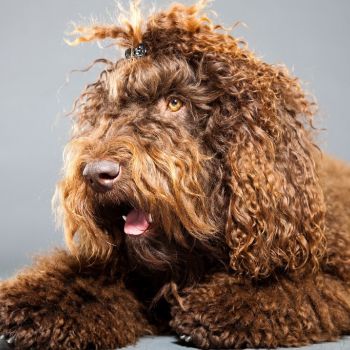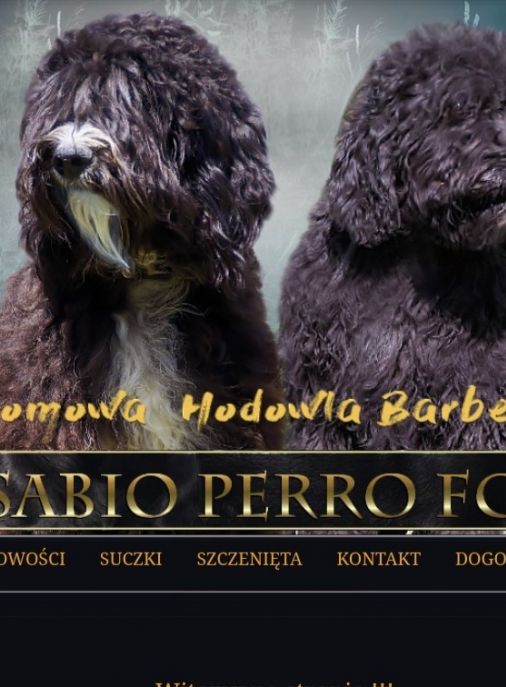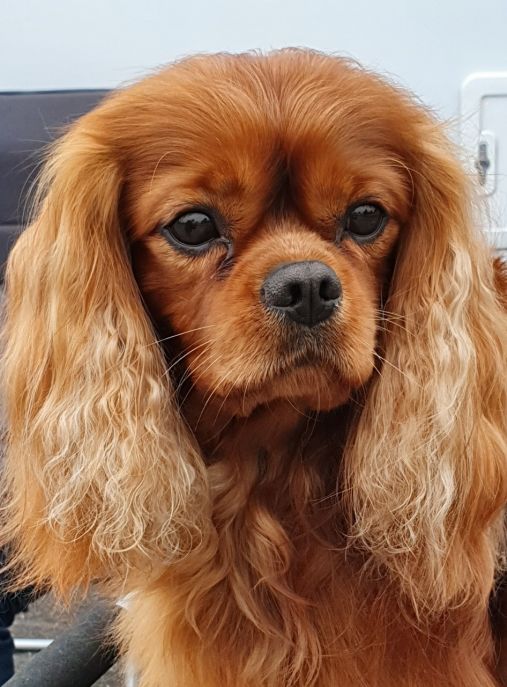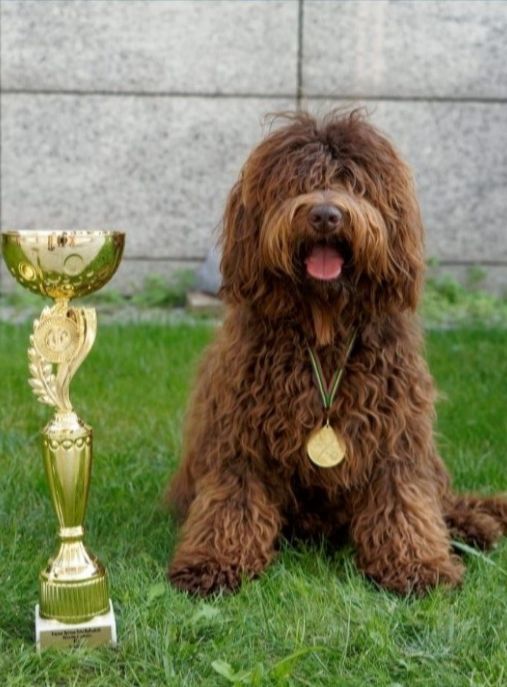The French Water Dog, also known as the Barbet, is a versatile and intelligent breed that has a long history as a working dog. With its distinctive curly coat and friendly demeanor, the Barbet is a beloved breed that is gaining popularity around the world. In this text, we will explore the history, characteristics, and interesting facts about the French Water Dog.
The Barbet has a rich history that dates back several centuries. It is believed to have originated in France, where it was primarily used as a water retriever and a hunting companion. The breed's name, "Barbet," is derived from the French word "barbe," which means beard, referring to the dog's facial hair.
According to the FCI (Fédération Cynologique Internationale) typology, the Barbet belongs to Group 8 - Retrievers, Flushing Dogs, and Water Dogs. This group includes breeds that were developed for water work, such as retrieving game from water or flushing out birds. The Barbet is classified under Section 3 - Water Dogs, along with other water-loving breeds like the Portuguese Water Dog and the Spanish Water Dog.
The French Water Dog is a versatile breed that excels in various roles. Historically, it was primarily used for water retrieval during hunting expeditions. Its dense, curly coat provided protection from the cold water, and its webbed feet made it an excellent swimmer. Today, the Barbet is still used for water work, but it has also found success in other areas such as therapy work, search and rescue, and even dog sports like agility and obedience.
In terms of physical characteristics, the Barbet is a medium-sized dog with a sturdy build. Males typically weigh between 40 to 60 pounds (18 to 27 kg), while females are slightly smaller, weighing between 35 to 50 pounds (16 to 23 kg). The height at the withers ranges from 20 to 24 inches (50 to 61 cm) for males and 19 to 22 inches (48 to 56 cm) for females.
One of the most distinctive features of the Barbet is its curly, woolly coat. The dense, waterproof curls cover the entire body, including the face and ears. The coat comes in various colors, including black, brown, fawn, and white. Some Barbet dogs may have a solid color coat, while others may have white markings or a parti-color pattern.
The Barbet's coat requires regular grooming to prevent matting and to maintain its health and appearance. Regular brushing, combing, and occasional trimming are necessary to keep the coat in good condition. The breed is considered hypoallergenic, making it a suitable choice for individuals with allergies.
In terms of temperament, the Barbet is known for its friendly and sociable nature. It is an affectionate breed that forms strong bonds with its family members. The Barbet is generally good with children and other pets, making it a suitable choice for families. However, early socialization and training are essential to ensure that the dog develops into a well-rounded and obedient companion.
The French Water Dog has a moderate energy level and requires regular exercise to keep it physically and mentally stimulated. Daily walks, playtime, and activities that engage its intelligence are necessary to prevent boredom and destructive behavior. The Barbet's love for water means that swimming is an excellent form of exercise for this breed.
The average lifespan of the Barbet is around 12 to 15 years, which is relatively long for a medium-sized dog. However, like all breeds, the Barbet is prone to certain health issues. Some common health concerns in the breed include hip dysplasia, progressive retinal atrophy (PRA), and certain skin conditions. Responsible breeders conduct health screenings and genetic testing to minimize the risk of these conditions in their breeding lines.
In conclusion, the French Water Dog, or Barbet, is a versatile and intelligent breed with a rich history as a working dog. Its distinctive curly coat, friendly temperament, and water-loving nature make it a unique and beloved breed. Whether as a hunting companion, therapy dog, or family pet, the Barbet brings joy and companionship to its owners. With proper care, training, and socialization, the Barbet can thrive as a loyal and loving member of any family.
The French Water Dog, also known as the Barbet, is a charming and intelligent breed with a unique character. These dogs have a long history as working dogs, specifically bred for water retrieval and hunting. Today, they are beloved family pets known for their friendly nature, loyalty, and versatility.
One of the most notable traits of the Barbet is their friendly and sociable nature. They are known to be excellent with children and get along well with other pets, making them a great choice for families. This breed thrives on human companionship and loves to be a part of all family activities. They are often described as being gentle, patient, and affectionate, making them an ideal choice for families with young children.
Barbets are highly intelligent dogs and are quick learners. They are known for their problem-solving abilities and can be quite independent thinkers. However, this intelligence can sometimes lead to stubbornness, so consistent and patient training is essential. Positive reinforcement techniques work best with this breed, as they respond well to praise, treats, and play.
As a working breed, Barbets have a natural instinct for water and excel in various water-related activities. They are excellent swimmers and have a water-resistant coat that helps them stay warm and buoyant. This makes them great companions for water sports such as dock diving, retrieving, and even water rescue. Regular exercise, including swimming, is crucial to keep them mentally and physically stimulated.
When it comes to grooming, the Barbet requires regular maintenance due to their unique coat. Their dense, curly, and woolly fur is hypoallergenic, making them a suitable choice for individuals with allergies. However, their coat requires regular brushing to prevent matting and occasional professional grooming to maintain its health and appearance. Regular ear cleaning is also necessary to prevent infections, as their long, floppy ears can trap moisture.
Early socialization and training are vital for Barbets to ensure they grow up to be well-rounded and obedient dogs. Exposing them to various environments, people, and other animals from a young age will help them develop into confident and friendly adults. Basic obedience training should start early, focusing on commands such as sit, stay, and recall. Engaging them in mentally stimulating activities like puzzle toys and obedience training will help keep their intelligent minds occupied.
It is important to note that Barbets are not suited for a sedentary lifestyle. They require regular exercise and mental stimulation to prevent boredom and potential behavioral issues. Daily walks, playtime, and training sessions are necessary to keep them happy and healthy. They also enjoy participating in dog sports such as agility, obedience, and tracking.
In conclusion, the French Water Dog, or Barbet, is a delightful breed with a friendly and sociable nature. They are intelligent, versatile, and excel in water-related activities. With proper training, socialization, and regular exercise, they make excellent family pets and are well-suited for active individuals or families who enjoy spending time outdoors.
The French Water Dog, also known as the Barbet, is a beautiful and intelligent breed that requires specific care to ensure their health and happiness. Here are some tips on how to care for Barbet dogs, including what to do and what not to do:
1. Grooming: The Barbet has a thick, curly coat that requires regular grooming to prevent matting and keep it in good condition. Brush their coat at least once a week to remove any tangles or debris. Regular bathing is also necessary to keep their coat clean. However, avoid over-bathing as it can strip the natural oils from their skin.
2. Coat Care: To maintain the Barbet's unique coat texture, avoid shaving or cutting their hair too short. Trimming the hair around their eyes and paws is acceptable, but the rest of their coat should be left untouched. Regularly check their ears for any signs of infection or excessive wax buildup and clean them gently with a veterinarian-approved ear cleaner.
3. Exercise: Barbet dogs are active and energetic, so they require regular exercise to keep them physically and mentally stimulated. Daily walks, playtime, and interactive activities such as agility training or swimming are highly recommended. However, avoid excessive exercise in extreme weather conditions to prevent overheating or exhaustion.
4. Training and Socialization: Barbet dogs are highly intelligent and eager to please, making them relatively easy to train. Start their training early, using positive reinforcement techniques such as treats and praise. Socialize them from a young age by exposing them to various environments, people, and other animals to ensure they grow up to be well-rounded and friendly dogs.
5. Diet and Nutrition: Provide a balanced and nutritious diet that meets the specific needs of your Barbet. Consult with your veterinarian to determine the appropriate portion sizes and choose high-quality dog food that contains essential nutrients. Avoid overfeeding to prevent obesity, which can lead to various health issues.
6. Health Care: Regular veterinary check-ups are crucial to monitor your Barbet's overall health and catch any potential issues early on. Vaccinations, parasite prevention, and dental care should be part of their routine healthcare. Additionally, be aware of breed-specific health concerns such as hip dysplasia and progressive retinal atrophy (PRA), and discuss appropriate screenings with your vet.
7. Mental Stimulation: Barbet dogs are intelligent and thrive on mental stimulation. Provide them with interactive toys, puzzle games, and training sessions to keep their minds engaged. Engaging in activities that tap into their natural instincts, such as retrieving or scent work, can also be highly beneficial.
What NOT to do:
1. Do not leave your Barbet alone for extended periods. They are social dogs and can become anxious or develop behavioral issues if left alone for too long.
2. Avoid harsh training methods or punishment-based techniques. Barbet dogs respond best to positive reinforcement and gentle guidance.
3. Do not neglect their dental hygiene. Regularly brush their teeth and provide appropriate dental chews or toys to prevent dental diseases.
4. Avoid overfeeding or feeding them inappropriate human food. Some human foods can be toxic to dogs, so stick to a balanced and appropriate diet.
5. Do not skip regular exercise. Lack of physical activity can lead to obesity and behavioral problems.
In conclusion, caring for a Barbet requires regular grooming, exercise, training, and a balanced diet. By following these tips and avoiding common mistakes, you can provide your Barbet with the love, care, and attention they need to thrive.
The French Water Dog, also known as the Barbet, is a breed that possesses a wide range of coat colors. However, there is one color that is commonly associated with this breed, and that is black. The black coat of the Barbet is a defining characteristic that adds to its charm and elegance.
When we talk about the black color of the Barbet, it is not just a simple, plain black. It is a rich, deep black that exudes a sense of sophistication and allure. The coat is dense and curly, giving it a unique texture that is both soft to the touch and visually appealing. The curls in the coat are tight and well-formed, adding to the overall beauty of the dog.
The black color of the Barbet's coat is not uniform throughout. It often has variations in shade, with some areas appearing slightly lighter or darker than others. This adds depth and dimension to the coat, making it even more captivating. The variations in shade can be seen in different lighting conditions, giving the dog an ever-changing appearance.
One of the most striking features of the black Barbet is its ability to reflect light. When the sun hits its coat, it creates a beautiful sheen that enhances the black color, making it appear even more lustrous. This reflective quality adds a touch of elegance and sophistication to the dog's appearance, making it truly stand out.
In addition to its stunning black coat, the Barbet often has other distinguishing features. It has a well-proportioned body with a strong, muscular build. Its head is broad and round, with a well-defined stop and a black nose that complements its coat perfectly. The eyes are usually dark and expressive, adding to the overall appeal of the dog.
The black color of the Barbet's coat not only adds to its aesthetic appeal but also serves a practical purpose. It provides excellent camouflage in certain environments, making it an ideal working dog in fields and water. The dense, curly coat helps protect the dog from cold water and harsh weather conditions, allowing it to perform its tasks with ease.
In conclusion, the black color of the French Water Dog, or Barbet, is a captivating and defining characteristic of this breed. Its rich, deep black coat with variations in shade, combined with its unique texture and reflective quality, make it a truly stunning and elegant dog. Whether working in the field or simply being a beloved companion, the black Barbet is sure to turn heads and capture hearts with its beauty and charm.
The health of French Water Dog, also known as Barbet, is generally robust and resilient. These medium-sized dogs are known for their friendly and sociable nature, making them popular family pets. However, like any breed, they are prone to certain health issues that owners should be aware of to ensure their well-being.
One of the most common health concerns in Barbet dogs is hip dysplasia. This is a hereditary condition where the hip joint doesn't develop properly, leading to discomfort, pain, and eventually arthritis. Regular exercise and maintaining a healthy weight can help reduce the risk of hip dysplasia. Responsible breeders often perform hip evaluations on their breeding dogs to minimize the occurrence of this condition.
Another prevalent health issue in Barbet dogs is progressive retinal atrophy (PRA). PRA is a degenerative eye disease that leads to gradual vision loss and, in severe cases, blindness. Regular eye examinations by a veterinary ophthalmologist can help detect PRA early on, allowing for appropriate management and support for affected dogs.
Barbets are also prone to certain skin conditions, including allergies and dermatitis. These dogs have a dense, curly coat that requires regular grooming to prevent matting and skin irritations. Regular brushing, bathing with appropriate dog-friendly products, and keeping the coat clean and well-maintained can help minimize the risk of skin issues.
Like many other breeds, Barbet dogs can also suffer from ear infections. Their floppy ears can trap moisture and debris, creating a favorable environment for bacterial or yeast overgrowth. Regular ear cleaning with veterinarian-approved solutions and keeping the ears dry can help prevent infections. It's important to be gentle while cleaning the ears to avoid causing any damage.
Maintaining a healthy diet is crucial for the overall well-being of Barbet dogs. A balanced diet that includes high-quality dog food, appropriate for their age and activity level, can help prevent obesity and associated health problems. Regular exercise, such as daily walks or playtime, is essential to keep them physically fit and mentally stimulated.
Regular veterinary check-ups are vital for monitoring the health of Barbet dogs. Routine vaccinations, parasite prevention, and dental care should be part of their healthcare regimen. Additionally, it's important to provide a safe and stimulating environment, free from hazards and potential toxins.
In conclusion, while the French Water Dog (Barbet) is generally a healthy breed, they are prone to certain health issues like hip dysplasia, progressive retinal atrophy, skin conditions, and ear infections. Responsible breeding practices, regular veterinary care, proper grooming, and a balanced diet are essential for maintaining their health and well-being. With proper care and attention, Barbet dogs can lead happy, healthy lives as beloved companions.
The French Water Dog, also known as the Barbet, is a breed known for its intelligence, agility, and friendly nature. To ensure the overall health and well-being of your Barbet, it is crucial to provide them with a balanced and nutritious diet. Proper nutrition plays a vital role in maintaining their energy levels, promoting healthy growth, and preventing various health issues.
When it comes to feeding your Barbet, it is essential to choose high-quality dog food that meets their specific nutritional needs. Look for dog food that contains real meat as the primary ingredient, as this provides the necessary protein for muscle development and maintenance. Additionally, the food should be rich in essential vitamins, minerals, and antioxidants to support their overall health.
A Barbet's diet should consist of a combination of dry kibble and wet food. Dry kibble helps to maintain dental health by reducing plaque and tartar buildup, while wet food provides hydration and adds variety to their meals. It is recommended to consult with a veterinarian to determine the appropriate portion sizes based on your dog's age, weight, and activity level.
In addition to commercial dog food, you can also include some fresh, whole foods in your Barbet's diet. Lean meats like chicken, turkey, or beef can be cooked and added to their meals occasionally. Fish, such as salmon or sardines, are an excellent source of omega-3 fatty acids, which promote healthy skin and coat. Fruits and vegetables like carrots, apples, and green beans can be offered as healthy treats or mixed into their food for added fiber and nutrients.
While it is important to provide a well-balanced diet, there are certain foods that should be avoided as they can be toxic or harmful to Barbet dogs. Some common foods that should not be given to your Barbet include chocolate, grapes, raisins, onions, garlic, avocados, and anything containing caffeine. These foods can cause various health issues ranging from gastrointestinal problems to organ failure.
It is crucial to monitor your Barbet's weight and adjust their diet accordingly. Obesity can lead to numerous health problems, including joint issues and heart disease. Avoid overfeeding and limit the number of treats given, as excessive calorie intake can quickly lead to weight gain.
Always ensure that your Barbet has access to fresh, clean water throughout the day. Hydration is essential for their overall health and helps maintain proper organ function.
In conclusion, providing a well-balanced and nutritious diet is crucial for the health and well-being of your Barbet. Choose high-quality dog food, incorporate fresh, whole foods, and avoid feeding them toxic or harmful substances. Regularly consult with your veterinarian to ensure that your Barbet's nutritional needs are being met, and adjust their diet as necessary. By following these guidelines, you can help your Barbet live a long, healthy, and happy life.







